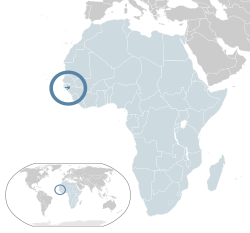Guinea-Bissau
Republic of Guinea-Bissau República da Guiné-Bissau (Portuguese) | |
|---|---|
Motto: "Unidade, Luta, Progresso" (Portuguese) "Unity, Struggle, Progress" | |
 Location of Guinea-Bissau (dark blue) – in Africa (light blue & dark grey) | |
| Capital and largest city | Bissau 11°52′N 15°36′W / 11.867°N 15.600°W |
| Official languages | Portuguese |
| Spoken languages | show
List: |
| Ethnic groups | |
| Religion |
|
| Demonym(s) | Bissau-Guinean[2] |
| Government | Unitary semi-presidential republic |
| Umaro Sissoco Embaló | |
| Nuno Gomes Nabiam | |
| Legislature | National People's Assembly |
| Independence from Portugal | |
• Declared | 24 September 1973 |
• Recognized | 10 September 1974 |
| Area | |
• Total | 36,125 km2 (13,948 sq mi) (134th) |
• Water (%) | 22.4 |
| Population | |
• 2018 estimate | 1,874,303[3][4] (148th) |
• Density | 46.9/km2 (121.5/sq mi) (154th) |
| GDP (PPP) | 2018 estimate |
• Total | $3.391 billion[5] |
• Per capita | $1,951[5] |
| GDP (nominal) | 2018 estimate |
• Total | $1.480 billion[5] |
• Per capita | $851[5] |
| Gini (2010) | high |
| HDI (2019) | low · 175th |
| Currency | West African CFA franc (XOF) |
| Time zone | UTC (GMT) |
| Driving side | right |
| Calling code | +245 |
| ISO 3166 code | GW |
| Internet TLD | .gw |
Guinea-Bissau (/ˌɡɪni bɪˈsaʊ/ (![]() listen); Portuguese: Guiné-Bissau, Fula:
listen); Portuguese: Guiné-Bissau, Fula:


